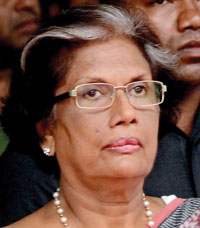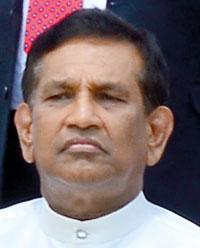News
LRC’s questionable leasing out of 528 properties under Rajitha’s watch
View(s):By Namini Wijedasa
Between 2002 and 2004, Sri Lanka’s Land Reform Commission (LRC) gave out more than 500 of its properties on lease to private parties. It happened under Rajitha Senaratne, who was Project Minister of Lands in the short-lived United National Front administration..
But, in August 2004, Chandrika Kumaratunga, then President, cancelled all land alienations carried out by the LRC during the period in question. A committee, on investigating the 528 deals, concluded that most had been politically motivated and outside accepted procedure. In some instances, it said, the Minister and LRC Chairman Lakshman Ranasinghe had exceeded their powers.

Chandrika Kumaratunga
Mangala Samaraweera, then Cabinet Spokesman, was blunter. He told journalists that the Lands Ministry had transferred properties to friends and relatives of politicians, and threatened legal action against those who refused to vacate these plots.
*Why then is the LRC grappling with this issue even today, more than a decade after the questionable deals were scrapped by Cabinet? *Why does the Auditor General’s Dept continue to flag it? *And, what has happened to lands that had been parcelled out on lease so liberally?
The answer, the Sunday Times found, is that, even the LRC has no clear idea. Sources from the Auditor General’s Dept said that, after President Kumaratunga’s Cabinet cancelled the transactions, the LRC stopped collecting rental on these lands, while the order was not firmly enforced on the ground.
Therefore, while some of those who had leased the properties did vacate as required, others stayed on. And the LRC still does not know how many there are in each category. According to applications examined by the committee appointed by President Kumaratunga, 190 of the 528 lands had been given out for house building, 243 for agricultural purposes and 95 for unspecified other purposes.
“It’s a double loss to the Government,” said an official, requesting anonymity. “For 12 years, the LRC has not taken rent for these lands, and are also unable to lease them out to others, or even the same parties.”

Rajitha Senarathna
The LRC was established in 1972 to fix a ceiling on the extent of agricultural land that may be owned by persons, and to provide for the vesting in the LRC, those lands owned in excess of such ceiling, among other things.
The Commission leases out properties for a maximum of 30 years, predominantly for house building and agriculture. A valuation is done by the Valuation Dept. The lease amount is 4% of the total worth for agricultural lands and 6% for non-agricultural lands. Five years rental is charged upfront.
The LRC, housed in a property at Hector Kobbekaduwa Mawatha, Colombo 7, a tired shell of a building that belongs to the Ministry of Public Administration, does things the old way. Officers shuffle ledgers (books) and yellowing old files, running their fingers over layers of dust. Many officials have been firmly entrenched there for years.
Records, the Auditor General’s Dept attests, are difficult to trace. The Commission is not even certain how many lands it has and who holds the leases on them. Cabinet, in December 2015, instructed the LRC to submit within two months, a detailed report on the quantity of lands it holds; where they are located; whether they are being used for development purposes and if so, the nature of development work; who has leased these lands; and on what criteria they had been handed out. The report has still not been handed over.
It was also decided that a committee must be formed in this regard, chaired by a senior official nominated by the Presidential Secretariat; a senior official nominated by the Secretary to the Ministry of Lands; a representative from the Treasury to the LRC; and the LRC’s Director General. The committee has not been set up.
The responsibility for taking any decision on the contentious 528 lands lies with Cabinet. Some of the parties who have taken over these lands and developed them, are eager to lease them again. A section of those who do not want to vacate, have filed legal action against the LRC, claiming they had invested in those lands.
The LRC says a Cabinet paper in this regard has already been presented. It asks for approval to reacquire unutilised lands and to take further action, as appropriate, regarding the rest. But there has been no response.
Sumanthissa Thambugala is LRC Chairman. He was forthright about the challenges the Commission faces. He said that, when the LRC was set up, it had around 100,000 acres of land. He admitted there had been shortfalls in record-keeping but said, steps were being taken to resolve the issue. Lists are being compiled at district level. The offices will be computerised in the near future.
As regards the 528 lands, a fresh Cabinet paper was submitted a few weeks ago, Mr Thambugala confirmed. They are distributed across Ratnapura, Kegalle, Kalutara, Gampaha, Colombo, Polonnaruwa, Anuradhapura, Moneragala, Matale, Hambantota and Galle. He said the recipients were not low-income families. “Some of them are quite rich,” he observed.

